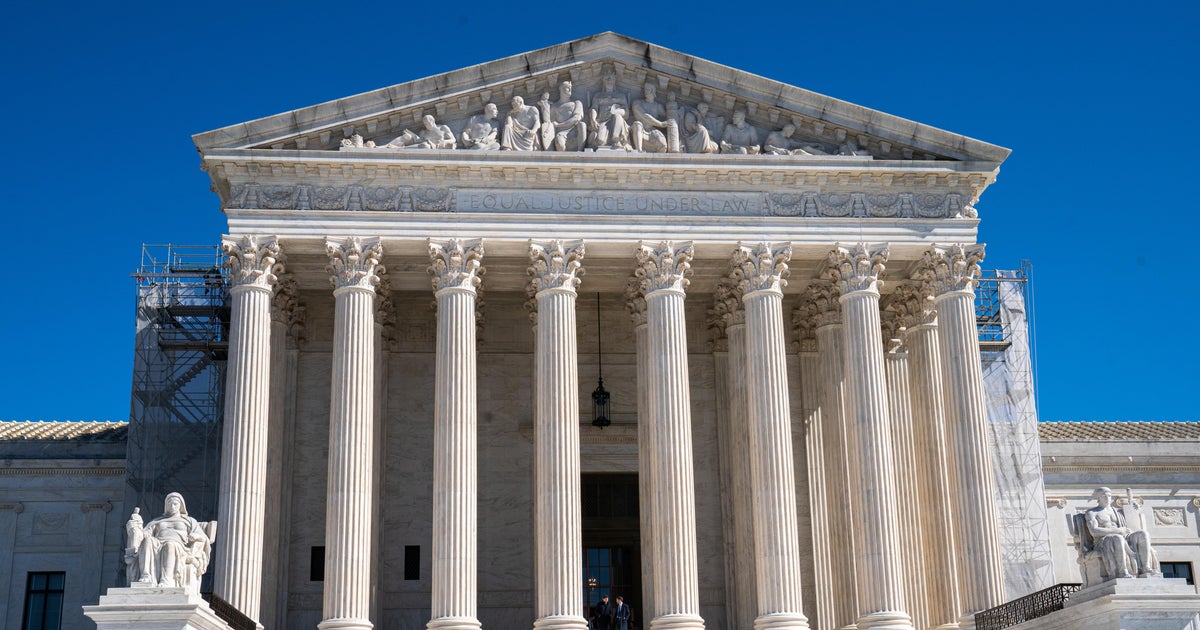CBS News
Supreme Court lays out new test for determining when public officials can be sued for blocking users on social media

Washington — The Supreme Court on Friday clarified when a public official who blocks a constituent on social media may be sued for doing so. It sent a pair of disputes over whether local officials crossed a constitutional line when they blocked users for Facebook comments back to lower courts for further proceedings.
In a unanimous opinion written by Justice Amy Coney Barrett in the first case, which involves a city manager from Port Huron, Michigan, the court laid out a two-pronged test for determining when a public official’s speech on social media is attributable to the government and can therefore lead to litigation.
Under the new standard, an official’s social-media activity constitutes state action only if that official had actual authority to speak on the government’s behalf, and “purported to exercise” that authority when speaking on social media. Social media users may then sue public officials for blocking them if that test is met.
The court said the standard that it laid out in its opinion differs from those applied by lower courts in the two cases involving public officials who blocked constituents on social media, and it sent the disputes back for additional proceedings consistent with its decision.
The justices heard arguments in both cases, known as Lindke v. Freed and O’Connor-Ratcliff v. Garnier, in October, during which they tackled questions of how elected officials interact with their constituents in the digital age, and when those interactions may infringe on free speech rights. The legal battles raised an issue that arose during former President Donald Trump’s presidency, when he was sued by some Twitter users who were blocked from interacting with his account. A federal appeals court said Trump’s move was unconstitutional, but the Supreme Court wiped away the decision and ordered the case dismissed after he left office.
The cases before the Supreme Court
The first case, involving Port Huron city manager James Freed, arose after resident Kevin Lindke posted comments to Freed’s Facebook page that criticized the city’s handling of the COVID-19 pandemic. Freed had a private Facebook profile that he converted to a public page after he was named city manager in 2014. The page identified him as a “public figure,” and listed a Port Huron website and email address, as well as City Hall for the physical address associated with the page.
Freed wore a city manager’s pin in the profile photo, and he used the page to share information about city programs, his work as city manager and, in early 2020, updates about the pandemic. He also shared personal updates.
While Freed and Lindke engaged in some back-and-forth on the Facebook page about the city’s COVID response, Freed deleted the constituent’s comments and blocked each of the three Facebook profiles that Lindke was using to post responses.
Lindke then sued, alleging his First Amendment rights were violated when Freed deleted his comments and blocked his accounts.
A federal district court ruled in favor of Freed, finding that his Facebook activity was not state action and therefore shielded from First Amendment scrutiny. The U.S. Court of Appeals for the 6th Circuit affirmed the lower court’s decision and laid out a “duty-or-authority test,” under which social media activity would be subject to constitutional scrutiny only if it is conducted in furtherance of governmental “duties” or where the activity depends on “state authority.”
Freed, the court said, was acting in his personal capacity and had not engaged in state action. No law required him to operate a Facebook page as part of his duties, and he didn’t rely on government resources, such as staff, to manage it, the 6th Circuit found. The profile also didn’t belong to the city manager’s office, the appeals court concluded.
The second case involved Michelle O’Connor-Ratcliff, the current vice president of the Poway Unified School District Board of Education, and T.J. Zane, a former board member. Each made public Facebook pages while running for positions on the school board in 2014. O’Connor-Ratcliff also had a public Twitter page.
Christopher and Kimberly Garnier, residents of San Diego County whose three children were enrolled in the school district, interacted with the board members’ social media accounts frequently, often with “repetitious and non-responsive comments and replies” to their Facebook posts and tweets, according to court papers. In one instance, Christopher Garnier made the same comment on 42 different posts by O’Connor-Ratcliff, and issued the same reply to 226 of her tweets.
In response to the comments, O’Connor-Ratcliff and Zane blocked the Garniers from their social media accounts, which prompted the couple to sue. The Garniers argued the board members violated their First Amendment rights by blocking them on social media, which they claimed were public spaces.
A federal district court sided with the Garniers, concluding that O’Connor-Ratcliff and Zane blocking them amounted to state action. The board members, the court found, “swathed [their social media pages] in the trappings of [their] office” by listing their positions as board members, identifying themselves as government officials and listing a school district email address on the page, in O’Connor-Ratcliff’s case.
The U.S. Court of Appeals for the 9th Circuit upheld the lower court’s decision and concluded the Garniers’ First Amendment rights had been violated. O’Connor-Ratcliff and Zane “acted under color of state law by using their social media pages as public fora in carrying out their official duties” because “they clothed their pages in the authority of their offices and used their pages to communicate about their official duties.”
The Supreme Court’s ruling
Writing for the unanimous court, Barrett said that the distinction between private conduct and state action “turns on substance, not labels: Private parties can act with the authority of the State, and state officials have private lives and their own constitutional rights.”
She emphasized that while a social media profile’s appearance and function are relevant for one prong of the new test, they “cannot make up for a lack of state authority.”
CBS News
Trump makes more Cabinet picks but some top economic posts remain unfilled

Watch CBS News
Be the first to know
Get browser notifications for breaking news, live events, and exclusive reporting.
CBS News
Open: This is “Face the Nation with Margaret Brennan,” Nov. 24, 2024

Watch CBS News
Be the first to know
Get browser notifications for breaking news, live events, and exclusive reporting.
CBS News
Popular gluten free tortilla strips recalled over possible contamination with wheat

A food company known for popular grocery store condiments has recalled a package of tortilla strips that may be contaminated with wheat, the U.S. Food and Drug Administration said Friday. The product is meant to be gluten-free.
Sugar Foods, a manufacturing and distribution corporation focused mainly on various toppings, artificial sweeteners and snacks, issued the recall for the “Santa Fe Style” version of tortilla strips sold by the brand Fresh Gourmet.
“People who have a wheat allergy or severe sensitivity to wheat run the risk of serious or life-threatening allergic reaction if they consume the product,” said Sugar Foods in an announcement posted by the FDA.
Packages of these tortilla strips with an expiration date as late as June 20, 2025, could contain undeclared wheat, meaning the allergen is not listed as an ingredient on the label. The Fresh Gourmet product is marketed as gluten-free.
Sugar Foods said a customer informed the company on Nov. 19 that packages of the tortilla strips actually contained crispy onions, another Fresh Gourmet product normally sold in a similar container. The brand’s crispy onion product does contain wheat, and that allergen is noted on the label.
U.S. Food and Drug Administration
No illnesses tied to the packaging mistake have been reported, according to the announcement from Sugar Foods. However, the company is still recalling the tortilla strips as a precaution. The contamination issue may have affected products distributed between Sept. 30 and Nov. 11 in 22 states: Arizona, California, Colorado, Florida, Georgia, Iowa, Idaho, Illinois, Indiana, Maryland, Maine, Michigan, Minnesota, North Carolina, New Jersey, Ohio, Oregon, Pennsylvania, Texas, Utah, Virginia and Washington.
Sugar Foods has advised anyone with questions about the recall to contact the company’s consumer care department by email or phone.
CBS News reached out to Sugar Foods for more information but did not receive an immediate reply.
This is the latest in a series of food product recalls affected because of contamination issues, although the others involved harmful bacteria. Some recent, high-profile incidents include an E. coli outbreak from organic carrots that killed at least one person in California, and a listeria outbreak that left an infant dead in California and nine people hospitalized across four different states, according to the Center for Disease Control and Prevention. The E. coli outbreak is linked to multiple different food brands while the listeria outbreak stemmed from a line of ready-to-eat meat and poultry products sold by Yu-Shang Foods.



